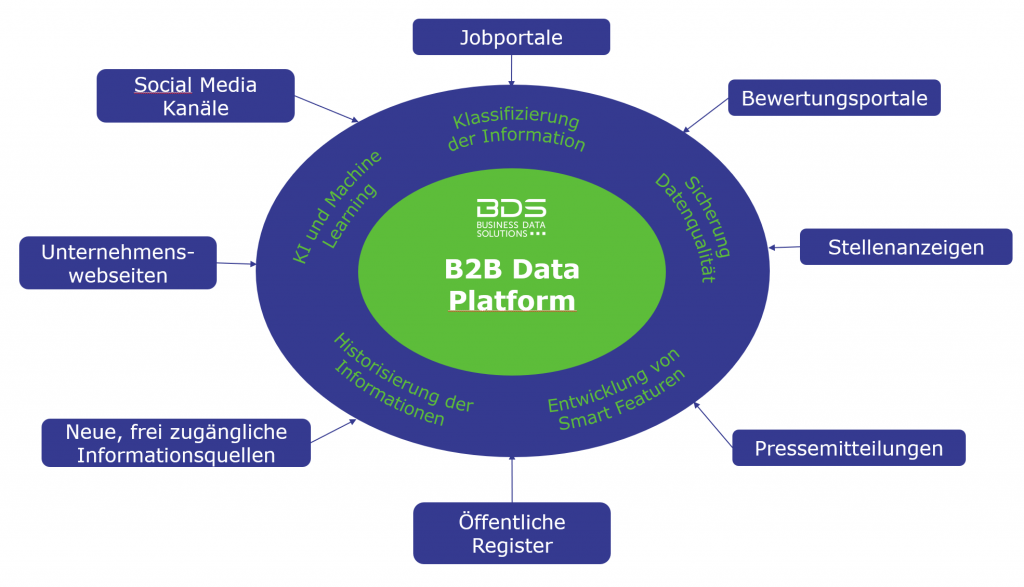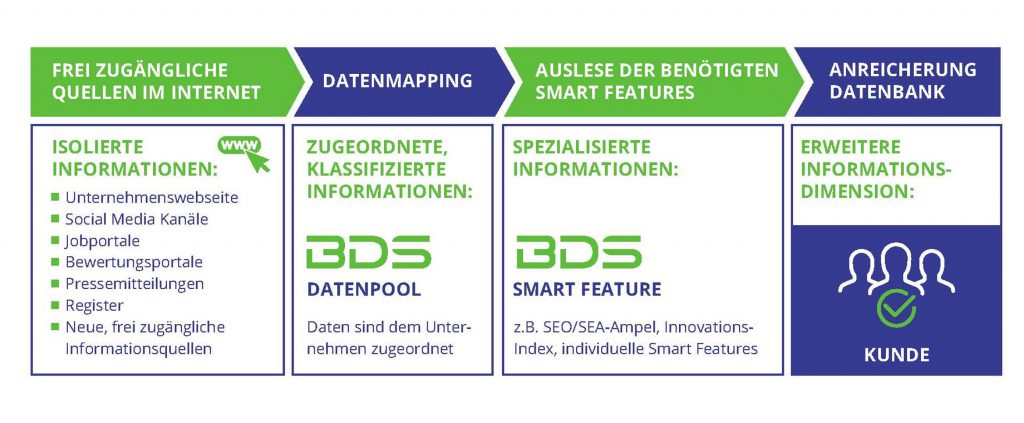Today we present you a real treasure trove of data.
Since its foundation, Business Data Solutions GmbH & Co. KG – BDS for short – has developed a real treasure trove of data: The BDS B2B Data Platform. A treasure trove of data that is constantly growing and becoming more valuable.
This highly refined information database forms the basis for optimally supporting companies in the field of data management. It’s about the elementary aspects
- Data Consolidation
- Duplicate check
- Data cleansing and
- Data enrichment
Or in short: data maintenance and enrichment. In the following article, we will introduce you, dear reader, to why the BDS DATA Platform is so special, what opportunities arise from it and how you and your company can benefit from it.
For whom is this article particularly interesting?
For all companies in the B2B sector with a database,
a) want to address the right companies for lead acquisition
b) need one-time support regarding their contact details, such as consolidating multiple data pots into a new target format
c) seek one-time support in terms of database cleanup and maintenance, e.g. if the database has not received much attention for a long time or d) wish to assist with regular tasks, such as monitoring certain characteristics, continuous enrichment or updating of their own data.
Of course, the article is also suitable for those people who want to learn more about sophisticated data management.
The content is structured into the following parts:
- Part 1: The BDS DATA Platform as “the” foundation to offer companies real added value
- Part 2: Smart features – so that your database itself becomes a “real treasure”
- Part 3: Data consolidation and audit + preparation – the best way to a clean database
- Part 4: Conclusion
Part 1: The BDS DATA Platform as “the” foundation to offer companies real added value
The BDS data treasure currently contains around 5 million economically active companies, 7 million contact persons, 10 million German-language domains and a whopping 3 billion keywords.

With this own reference database, the BDS B2B Data Platform, BDS optimally supports its customers in the field of data management. The data all come from public sources, are of course regularly reviewed or updated or supplemented. And all of this is 100% GDPR compliant.
How did BDS create a “real treasure trove of data” from the many unstructured data?
The BDS Data Platform brings together data from publicly available sources. As the graph shows, these are data from company websites, social media channels, job portals, rating portals, job advertisements, press releases, public registers and new, freely accessible sources of information.
With each update, a historicization of the information takes place. This means that BDS stores not only the new, but also the “old” data (a historical concatenation). In this way, relevant changes and developments since the beginning of BDS records are detected. That’s a real pound when cleaning up older data sets.
The blue circle describes what makes up the BDS Data Platform. The mostly unstructured data is elaborately processed and prepared for the processing or use of the data. AI and machine learning play a major role in this. AI and machine learning are used, among other things, for the classification of information, e.g. for the classification of job titles. Why? Almost every person writes their job title differently. With a few million contacts in the business portals, this is a Herculean task.
With AI and machine learning, the data is not only classified. The USP of the BDS Data Platform, the “Smart Features”, are also developed via it. What this is, we describe in the following 2nd part exactly.
On the subject of “AI and Machine Learning”, BDS has made a nearly 15-minute video available on its website:
Due to the complex refinement process of the unstructured data, the data can be used to optimize, compare and enrich the databases of BDS customers.
The special feature of the BDS Data Platform – compared to other providers in the field of data management:
BDS incorporates many more features than others into its own data platform.
In order to build a structured database with so many features, a lot of preparatory work has to be done. This preparatory work is usually not visible to BDS customers, but it is worthwhile and offers real added value. Of course, there is also an ongoing further development of the data platform.
By analyzing the domains, BDS offers a lot of data on companies that are not in the trade register. These are above all the large number of SMEs. The data portfolio and the selection possibilities of BDS are therefore extremely large. For many advertisers, this is very important to be able to address the companies not on mass, but on class (i.e. targeted).
Part 2: Smart Features – to turn your database into a “real treasure”
With its “Smart Features”, BDS offers numerous possibilities for data enrichment. These smart features are refined information that is developed from our own very extensive B2B Data Platform.
So what is a smart feature?
From the many different sources and data in the BDS Data Platform, a two-stage transformation takes place. First, unstructured data is transformed into structured basic data. Accumulation, categorization and analytical processing result in smart features. These smart feature criteria can then be specifically selected and thus used by companies for their purposes.
4 examples of how the Smart Features create added value:

Example 1: Provider of online trade fairs wants potential customers for acquisition
The following specifications and information from the online trade fair provider were available:
- Internationally active customers from Germany
- “Feeling” that marketing leadership is responsible AP
- A number of sample customers as a template for searching for further desired customers
The services of BDS:
- Step 1: An analysis of the sample customers:
- Are these active online, e.g. YouTube account, active social media profiles, etc. available
- Structural features of the homepage: scope of the website, multilingualism, blog, frequent changes on the website
- Certifications available
- Step 2: Generation of customer-specific smart features – i.e. identifying features to search for similar companies with comparable high potential
- Search including all determined AND specified characteristics on the Internet
– Parallel consulting e.g. - Refinement of the search criteria if the first result set is still too large
- Focus on sharp features
Result:
With the customer-specific smart features, 537 companies were found for the online trade fair provider. The online trade fair provider actively acquires a selection of 200 addresses. With the result of the acquisition, the Smart Feature model is then refined again.
With these very fine definitions of the target group (Smart Features), BDS finds extremely high-profile potential customers for acquisition. This reduces wastage and focuses the sales and marketing team on the important potentials. ⇒ More time for the high-caliber players.
Example 2: Seminar provider for training in the field of compliance
The requirement of the seminar provider was to find companies with specific, old ISO certifications, including the contact persons, e.g. in the area of compliance.
Based on the generated Smart Features 250, BDS has found suitable contact persons for the acquisition of the seminar provider.
Example 3: Perfect target group for a spirits manufacturer
For a large spirits manufacturer, BDS selected beverage retailers specializing in spirits. After an initial search/selection, one thing turned out: The target group of winegrowers was also included in the pool. However, this was not desired. In the next step, BDS excluded the winegrowers by means of suitable smart features.
The result: The spirits manufacturer has its perfectly defined target group.
Example 4: Construction companies
The customer: An internationally active construction company with many special activities
Request:
- The customer was interested in a targeted selection of suppliers for special activities
- It has a large but poorly segmented database. This means that the company does not easily find the right suppliers for campaigns. Either the wrong or too high a spreading width.
Classic problem:
- These special activities are not to be mapped via the standardized WZ code (e.g. concrete sawing, photovoltaic system construction, concrete cosmetics, etc.)
- There is a high turnover of companies in the market. The activity status must first be determined currently and lfd. be updated. It has to be clarified whether the information is only on the website, but the service is no longer offered or whether it is really actively carried out.
The corresponding services of BDS were:
- In coordination with the client, BDS developed the right word clouds and created suitable customer-specific smart features
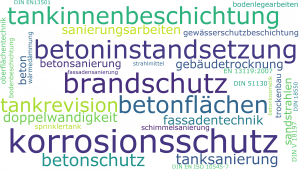
- Clustering of the customer database with the help of Smart Feature
- Enrichment of existing addresses with an activity status
- Regular updating of the supplier list with the current status.
Result:
The client receives a perfectly segmented supplier list, which is also updated regularly. The campaign results, which are based on this database, are highly accurate – and successful.
As always, there is no such thing as the lfd. Refinement/adaptation of the Smart Features must be carried out if necessary.
Here, the fewer potential leads, the better
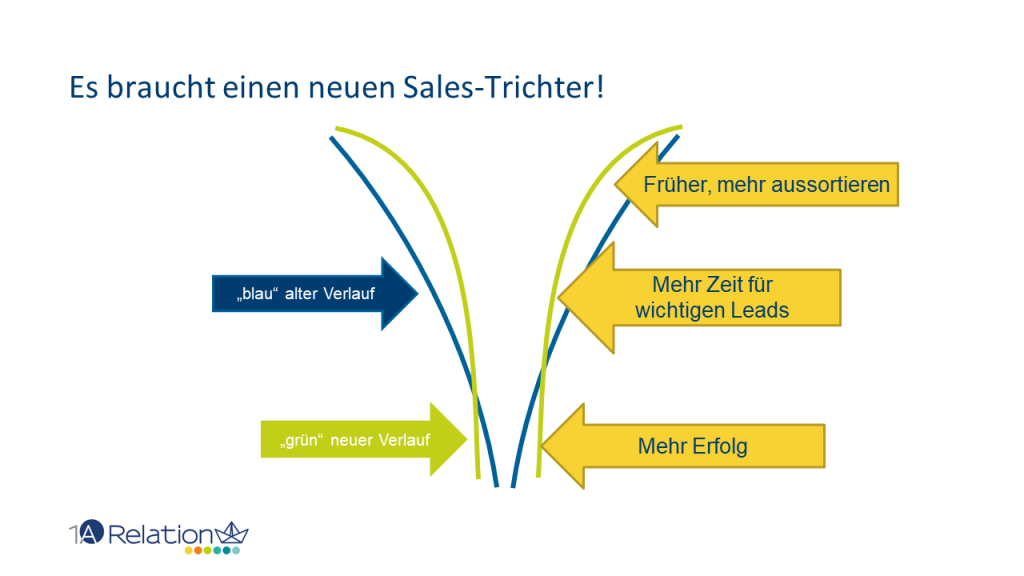
Further target groups and use cases for the use of smart features
This procedure “finding suitable contacts” works for the enrichment, checking and supplementation of customer data as well as for supplier data.
In other words, the Smart Features can be used for a wide variety of purposes and requirements and are in principle suitable for every company.
The Benefits of Smart Features
On the one hand, data enrichment with the smart features is therefore a perfect opportunity for companies to turn their database into a “real treasure”. With internal and external data, the company receives a statistically extremely stable customer rating and not just lead scoring.
On the other hand, for lead and customer management, the connection and lfd. Optimization of customer data including monitoring of changes in the network or partner data highlights.
The large Smart Feature Feature Catalog from BDS can be used in a variety of ways. Under the following link you can take a look at some of the features: BDS_Merkmalskatalog
If you want to learn more about the Smart Features, you can find more information on the BDS website.
Part 3: Preparing and performing data consolidation and address audit – the best way to get a clean database.
BDS solves these problems:
Again and again we observe in our consulting projects that address and data quality is not a cost, but a value creation factor!
Many of you have probably already faced the problem: From 2 to 1. In other words, there are two databases or two systems that have to be merged (migrated) into one system. The requirements for the consolidated database are basically the same for all companies:
- No overlap in a single database
- Clean or well maintained
- Provided with corresponding added value (qualifying characteristics)
In order to create a uniform database with high quality from two data sources, some preparatory work is necessary. These are also described in the following section.
Highlights Data Consolidation – Preparations and Process
If a company plans to merge two data pots into a clean and overlap-free database, a lot of preparatory work has to be done before the actual consolidation. In general, it is a mixture of technical services as well as intensive consulting services that BDS offers. How does BDS do this?
The highlights and most important points:

Review of the data and adapted procedure
The first step is always the review of the affected data. What kind of data is it? This is an important question because, for example, certain tasks, such as a time-consuming update of prospect data, are evaluated differently than with customers and vendors. BDS defines the procedure individually based on the data and objectives.
Data hygiene – mucking out/disposing of waste
Before a duplicate check takes place, BDS checks whether or where and to what extent there is an “misuse of data fields”. After all, who doesn’t know that? In a record, a note is in a field not intended for this purpose, special characters have crept in or data errors have arisen due to export or import (e.g. the “leading zero” for postal codes or telephone numbers – unfortunately an absolute classic).
It also determines whether additional fields are needed or fields can be deleted (e.g. the amount of fields for company names) or how exactly fields must be divided (e.g. street & house number into one field or into several). Depending on this, the data is structured differently in advance.
Consolidation of data, intra- and inter-duplicate matching and post-processing
With Business Data Solutions (BDS), the consolidation of data always takes place in close coordination with the customer. First, the following questions and prioritization are clarified: What are the respective “leading” data? Which variables are taken from which data set? Which values are higher than others? What can be overwritten, what not?
There are several possibilities that BDS coordinates with its customers and determines individually. After the actual merging of the data into an overall database, BDS carries out another audit (more information in the following section) in order to find hidden duplicates and incorrect data.
This is especially important for old, rarely cleaned databases. According to the experience of BDS, after 10 years without data cleansing, about 50% of the B2B database is affected by changes. These still need to be cleaned up and enriched with the right information. It makes no sense to start a new system with outdated data.
The step-by-step approach: In constant dialogue with the customer
The customer and BDS meet in regular meetings, where the customer is asked individual questions based on concrete examples. On the basis of these meetings, the customer successively builds up a set of rules for ongoing maintenance for the future.
Project time for consolidation of 2 data pots:
Every company is different, so it is not possible to give an exact indication of the project time. It depends on
- The amount of data
- The quality of the data
- The difference between the source data pots and the target format
- How many of the corrections can be done automatically or must be done semi- or completely manually.
Another important aspect for a successful and fast project completion is also the customer’s capacities for decisions and rework. Experience shows that projects are successfully completed when the customer’s IT and specialist departments work in close cooperation. This means that for the user companies (depending on the size) the hiring of a caretaker is worthwhile. This is best someone from the management.
Tips: 1) For lasting added value, it is particularly important to maintain data regularly even after the project. 2) A special organizational connection of the topic at the customer is recommended. A responsible person or department reports directly to the managing director. 3) Very important, the employees need enough freedom for these tasks within the daily area of responsibility. Doing it “on the side”, that goes wrong. This leads to pointless Sisyphean work or extreme time delay. And everyone knows that data becomes obsolete very quickly! 4) A recommendation for the team size is at least 1.5 digits and upwards this is almost unlimited.
The benefits for the customer with BDS as a partner
In our discussions with BDS, we have found that BDS as a partner asks the right questions and defines goals and procedures. Priorities are defined on the basis of the specific requirements. BDS offers intensive advice on this.
Highlights Data Cleansing
The audit
When it comes to data cleansing, BDS offers an address and data quality audit in which the focus is on the company data. But audits with both personal data of company contact persons and audits with private person data are also possible.
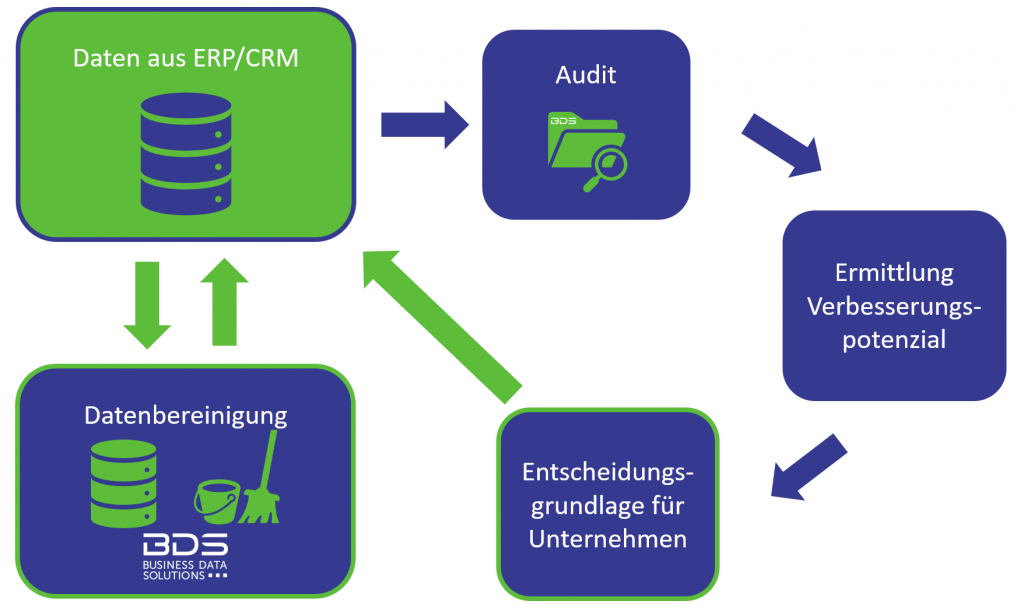
During an audit, BDS checks the data provided by a customer. From this, BDS identifies potential for improvement, which in turn serves the companies as a basis for decision-making for meaningful data cleansing.
When checking the company data, BDS compares the data records with its own highly refined reference data platform (the BDS B2B Data Platform) via an automatic search.
If no reference is found in the BDS Data Platform during an audit of company data or contact persons, partner data is also used to supplement this.
The contents of an audit:
- Postal verification of addresses
- Status information about the company data
- Need for change in the data pool
- Addition and correction of company names
- About duplicates
- Age of observed changes
- Overview of farm sizes
- Geographical distribution
- Industry Overview
Download the sample audit report here: Example Audit Report
By the way: We, 1A Relations GmbH, have already carried out a beneficial audit.
USP: strong duplicate test
Why is BDS so good at duplicate detection?
BDS decomposes the data fields according to various terms and information classes before a duplicate check, e.g. by legal form, various business terms, name components and regional terms. The comparison via the different information classes and individual name components leads to an extremely high hit rate!
Statement Mr. Wolff, Managing Director of BDS: The duplicate detection of BDS is so good that large companies that know something about duplicate matching have already asked if duplicate matching could not be installed as a software product at your site. Since the rules behind this are very complex and are not possible without corresponding reference tables, the implementation of a standalone solution is currently not envisaged.
Duplicate rating – the rating of the hits
If BDS finds duplicates, they are not deleted. The customers basically process the duplicates themselves. The customer receives these from BDS via an online tool (with an evaluation of the probability of duplicates) and makes the final decision himself.
In our experience, this is also a task that must necessarily lie with the customer. On the one hand, it is important that he bears responsibility for his data. On the other hand, processing the duplicates helps to learn how duplicates are created and how they can be better avoided in the future.
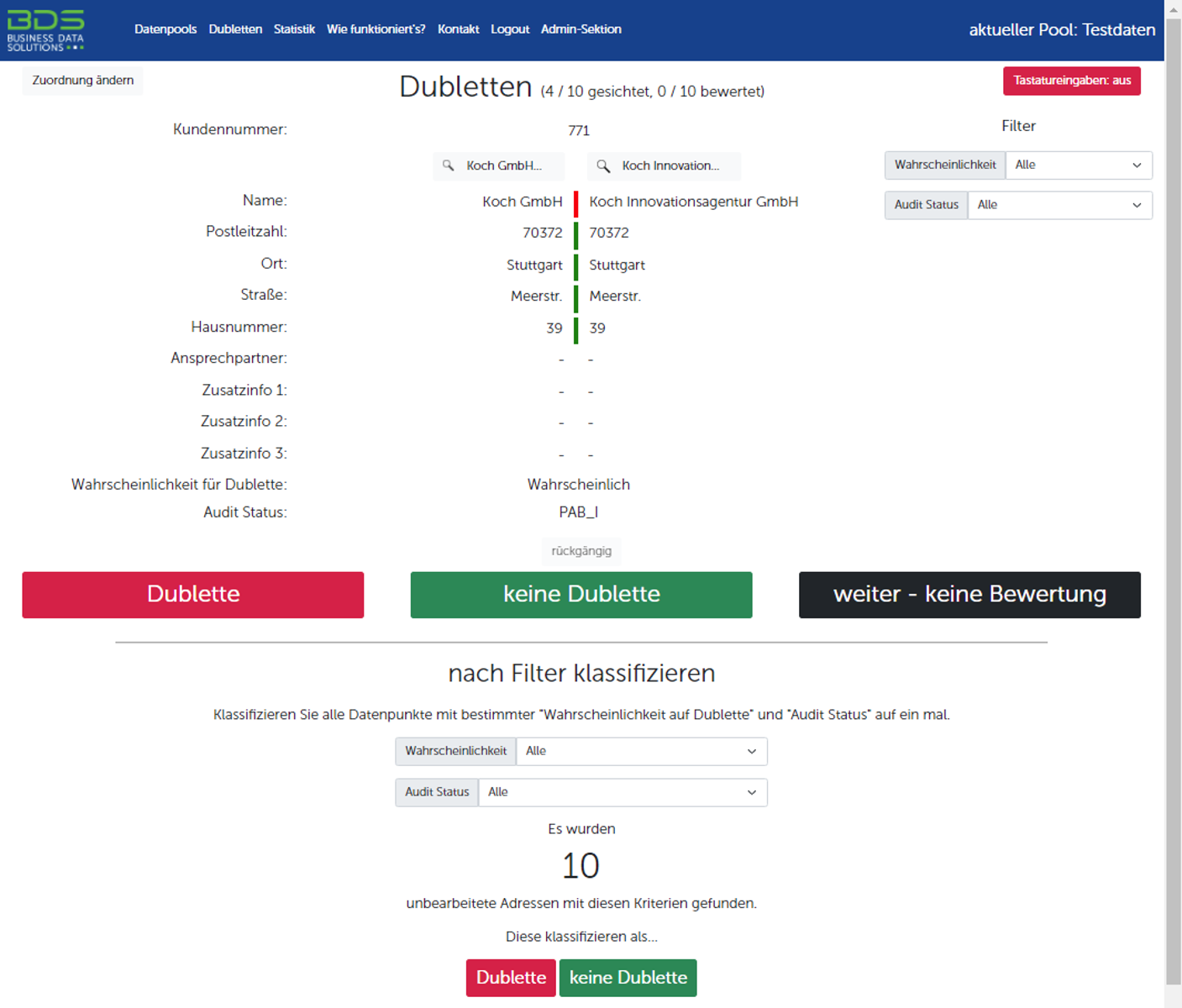
As the screenshot shows, the decision tool is very easy to use. The tool also contains a direct link to the Google search for the hit found in the reference database for a quick decision.
Data cleansing with BDS as a partner – the benefit:
A standardized approach of Business Data Solutions enables fast testing and implementation. But also a targeted adaptation to the respective customers and their individual requirements is offered.
If the customer is willing to work with the employees of his specialist departments and IT to improve data quality, the company embarks on the road to success on the subject of “successful data management”! Whether it is a one-time clean-up and consolidation of different databases or a long-term data management, as in the example here, both are important and correct.
A use case of the customer Aarsleff Rohrsanierung GmbH can be found on the BDS online website: Merge and clean up CRM databases
Part 4: Conclusion
In addition to the standardized products, BDS offers very good, individual advice. All in all, an address and data quality (AQDQ) full service – with everything that is necessary, from a single source!
BDS has many years of experience in its highly competent team and offers both
- in the basic business (fast implementation and presentation of results) as well as
- in the very complex project business (each time customer-specific approach)
Top advice.
The Smart Features create a huge added value in the enrichment or refinement of the data. This is a USP in the market.
According to our current assessment, BDS has one of the largest data pools. Both the width and depth are constantly expanded and regularly updated (daily/monthly depending on the data type or necessity). New sources are constantly being added. This means that new smart features can be developed.
BDS continuously adapts its product range to the requirements of the market or individual customers. BDS already offers data licenses for individual industry pools and complete databases.
With the technical know-how, BDS can also offer a variety of automated services. From continuous inventory updating to enrichment with individual features, everything is in the portfolio.
BDS is a data professional who discusses the goal, the requirements as well as the approach and the process individually with the customers. “Solid craftsmanship” ⇒ This means: The perfect mix of standardization and automated processes in conjunction with creative data generation or individual consulting!
Note: This is a machine translation. It is neither 100% complete nor 100% correct. We can therefore not guarantee the result.









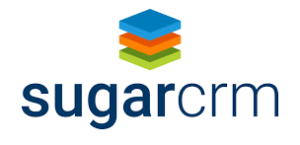
 CAS Software AG ist Marktführer für Kundenbeziehungsmanagement (CRM) im deutschen Mittelstand. Ob Marketing, Vertrieb oder Service – Anwender profitieren von effizienten Prozessen auf einer einheitlichen Datenbasis.
CAS Software AG ist Marktführer für Kundenbeziehungsmanagement (CRM) im deutschen Mittelstand. Ob Marketing, Vertrieb oder Service – Anwender profitieren von effizienten Prozessen auf einer einheitlichen Datenbasis.

